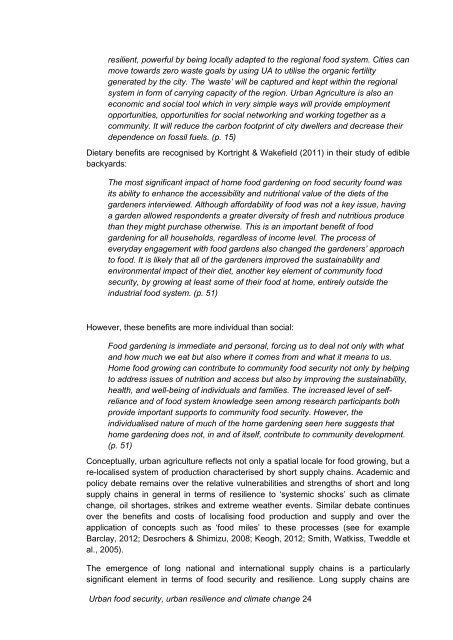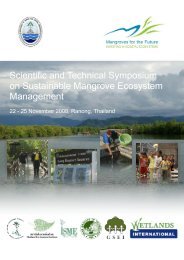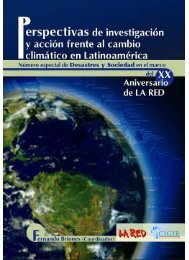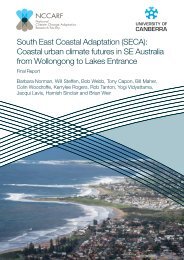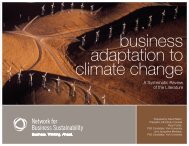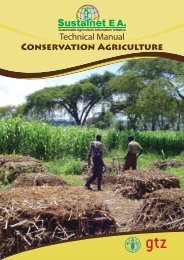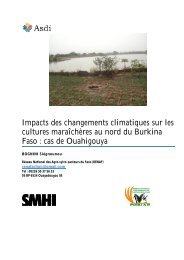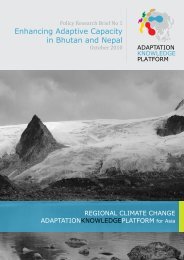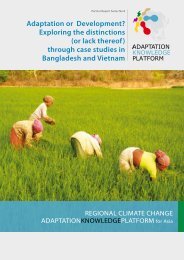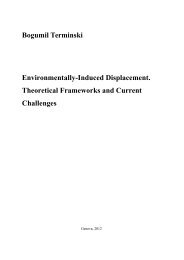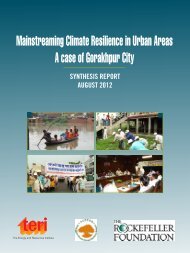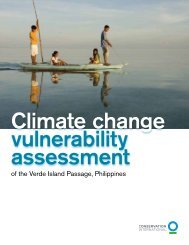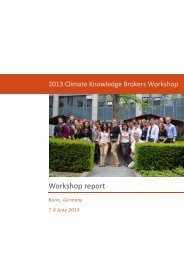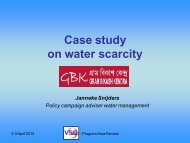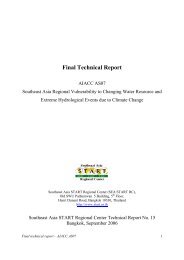eviews of community <strong>food</strong> <strong>security</strong> interventions conducted <strong>and</strong> these have identifiedthe need for more rigorous evaluation <strong>and</strong> the importance of highlighting the processissues in program implementation (p. 4).However, <strong>urban</strong> agriculture is widely held (Browne et al., 2009; Condon et al., 2010;PMSEIC, 2010; Brown & Carter, 2003; de Zeeuw & Dubbeling, 2009; Havaligi, 2009;Burns et al., 2010) to offer a number of benefits in relation to broad conceptions of <strong>food</strong><strong>security</strong>. For example, one of the most common forms of <strong>urban</strong> agriculture in cities ofthe developed world are community gardens, run by community groups, churches orschools <strong>and</strong> often with the support of local governments. Browne et al., (2009) describea number of their benefits:While:Community gardens increase access to fresh fruit <strong>and</strong> vegetables, particularly forparticipants, <strong>and</strong> provide opportunities for physical activity, community pride <strong>and</strong>social interaction through gardening. (p. 12)The value of school based gardens is that learning about gardening, composting,healthy eating <strong>and</strong> cooking can be integrated into the school curriculum in apositive <strong>and</strong> practical way. (p. 12)They also describe the long established practice of municipal allotments in the UK,where small plots of l<strong>and</strong> are leased very cheaply to local residents so that they cangrow their own produce. In these settings communal activities may occur but are not anexpectation or requirement of the lease, which typically requires only that the plot iskept free from invasive weeds.PMSEIC (2010) acknowledges the range of benefits <strong>and</strong> motivations for <strong>urban</strong> <strong>food</strong>production:There is evidence that the increased production of <strong>food</strong> in <strong>urban</strong> environments isin response to heightened awareness of the environmental impacts of <strong>food</strong>production, <strong>food</strong> transport costs <strong>and</strong> the costs of inputs such as energy <strong>and</strong>water. The <strong>urban</strong> production of <strong>food</strong> can have a range of social, environmental<strong>and</strong> health benefits that address issues of <strong>food</strong> <strong>security</strong>. These include increasingthe consumption of fresh <strong>food</strong>s, developing <strong>and</strong> strengthening communities,providing culturally appropriate <strong>food</strong>s <strong>and</strong> increasing awareness of <strong>food</strong>production systems. (p. 44)<strong>Urban</strong> agriculture is seen in this view to be both a response to greater publicawareness of the quality <strong>and</strong> price of fresh locally grown <strong>food</strong>, <strong>and</strong> as a means ofraising awareness even further.The social <strong>and</strong> transformative capacity of <strong>urban</strong> agriculture is described by Havaligi(2009) as part of a ‘multi-pronged tool’ for <strong>climate</strong> <strong>change</strong> adaptation <strong>and</strong> mitigation:<strong>Urban</strong> Agriculture is important for its productive acreage but it is more importantfrom the perspective of transforming <strong>urban</strong> dwellers from being consumers into acommunity of co-producers. By participating in UA, people can develop a deeperunderst<strong>and</strong>ing for <strong>food</strong> <strong>and</strong> respect for the farmers who dedicate their lives togrowing it. By networking with local farms in a 150-mile radius cities can become<strong>Urban</strong> <strong>food</strong> <strong>security</strong>, <strong>urban</strong> <strong>resilience</strong> <strong>and</strong> <strong>climate</strong> <strong>change</strong> 23
esilient, powerful by being locally adapted to the regional <strong>food</strong> system. Cities canmove towards zero waste goals by using UA to utilise the organic fertilitygenerated by the city. The ‘waste’ will be captured <strong>and</strong> kept within the regionalsystem in form of carrying capacity of the region. <strong>Urban</strong> Agriculture is also aneconomic <strong>and</strong> social tool which in very simple ways will provide employmentopportunities, opportunities for social networking <strong>and</strong> working together as acommunity. It will reduce the carbon footprint of city dwellers <strong>and</strong> decrease theirdependence on fossil fuels. (p. 15)Dietary benefits are recognised by Kortright & Wakefield (2011) in their study of ediblebackyards:The most significant impact of home <strong>food</strong> gardening on <strong>food</strong> <strong>security</strong> found wasits ability to enhance the accessibility <strong>and</strong> nutritional value of the diets of thegardeners interviewed. Although affordability of <strong>food</strong> was not a key issue, havinga garden allowed respondents a greater diversity of fresh <strong>and</strong> nutritious producethan they might purchase otherwise. This is an important benefit of <strong>food</strong>gardening for all households, regardless of income level. The process ofeveryday engagement with <strong>food</strong> gardens also <strong>change</strong>d the gardeners’ approachto <strong>food</strong>. It is likely that all of the gardeners improved the sustainability <strong>and</strong>environmental impact of their diet, another key element of community <strong>food</strong><strong>security</strong>, by growing at least some of their <strong>food</strong> at home, entirely outside theindustrial <strong>food</strong> system. (p. 51)However, these benefits are more individual than social:Food gardening is immediate <strong>and</strong> personal, forcing us to deal not only with what<strong>and</strong> how much we eat but also where it comes from <strong>and</strong> what it means to us.Home <strong>food</strong> growing can contribute to community <strong>food</strong> <strong>security</strong> not only by helpingto address issues of nutrition <strong>and</strong> access but also by improving the sustainability,health, <strong>and</strong> well-being of individuals <strong>and</strong> families. The increased level of selfreliance<strong>and</strong> of <strong>food</strong> system knowledge seen among research participants bothprovide important supports to community <strong>food</strong> <strong>security</strong>. However, theindividualised nature of much of the home gardening seen here suggests thathome gardening does not, in <strong>and</strong> of itself, contribute to community development.(p. 51)Conceptually, <strong>urban</strong> agriculture reflects not only a spatial locale for <strong>food</strong> growing, but are-localised system of production characterised by short supply chains. Academic <strong>and</strong>policy debate remains over the relative vulnerabilities <strong>and</strong> strengths of short <strong>and</strong> longsupply chains in general in terms of <strong>resilience</strong> to ‘systemic shocks’ such as <strong>climate</strong><strong>change</strong>, oil shortages, strikes <strong>and</strong> extreme weather events. Similar debate continuesover the benefits <strong>and</strong> costs of localising <strong>food</strong> production <strong>and</strong> supply <strong>and</strong> over theapplication of concepts such as ‘<strong>food</strong> miles’ to these processes (see for exampleBarclay, 2012; Desrochers & Shimizu, 2008; Keogh, 2012; Smith, Watkiss, Tweddle etal., 2005).The emergence of long national <strong>and</strong> international supply chains is a particularlysignificant element in terms of <strong>food</strong> <strong>security</strong> <strong>and</strong> <strong>resilience</strong>. Long supply chains are<strong>Urban</strong> <strong>food</strong> <strong>security</strong>, <strong>urban</strong> <strong>resilience</strong> <strong>and</strong> <strong>climate</strong> <strong>change</strong> 24
- Page 1 and 2: Synthesis and Integrative ResearchF
- Page 3 and 4: Published by the National Climate C
- Page 5 and 6: ABSTRACTFood security is increasing
- Page 7 and 8: 1. a review of the literature: on n
- Page 9 and 10: its Food for All project. This help
- Page 13 and 14: In response to the existential thre
- Page 15 and 16: 2. OBJECTIVES OF THE RESEARCHFood i
- Page 17 and 18: debates and to the more systematic
- Page 19 and 20: organisation in the past few years.
- Page 21 and 22: 4. RESULTSIn this section we presen
- Page 23 and 24: increasing productivity. Thus, whil
- Page 25 and 26: people and the origins of their foo
- Page 27 and 28: urban food supply chains. Thus, whi
- Page 29 and 30: This logistics system is dominated
- Page 31: Like Hodgson et al., as per definit
- Page 35 and 36: volume or even its contribution to
- Page 37: community food growing can have on
- Page 40 and 41: generations this history has been f
- Page 42 and 43: a stronger focus on addressing the
- Page 44 and 45: The third key aspect is fairness -
- Page 46 and 47: climate (which we live and work in
- Page 48 and 49: agriculture. Eight percent is in ur
- Page 50 and 51: This concept of the ‘spaces in be
- Page 52 and 53: esearch scientist and chair of the
- Page 54 and 55: As discussed above, protection of t
- Page 56: 4.2.5 What is the extent and the im
- Page 60 and 61: no place under the panoply of pract
- Page 62 and 63: increased, the market dominance of
- Page 64 and 65: … the residents of S Park called
- Page 66 and 67: 5. CONCLUSIONSThere is growing conc
- Page 68 and 69: urban resilience. This inevitably c
- Page 70 and 71: In many respects these contrasting
- Page 72 and 73: Many interviewees of both standpoin
- Page 74 and 75: a given area. The rationale for thi
- Page 76 and 77: mapping the location of sources of
- Page 78 and 79: Australian food policy debates refl
- Page 80 and 81: APPENDIX 1: URBAN FOOD SECURITY, UR
- Page 82 and 83:
IntroductionGlobally, and in Austra
- Page 84 and 85:
Review methodsThis stage of the res
- Page 86 and 87:
despite many of the causes of food
- Page 88 and 89:
…by 2050… food production will
- Page 90 and 91:
2. How is food security (in general
- Page 92 and 93:
the food security of cities, but no
- Page 94 and 95:
While some see the density of devel
- Page 96 and 97:
when suppliers, distributors, and c
- Page 98 and 99:
a more prominent role in enhancing
- Page 100 and 101:
community gardens webpage on the Co
- Page 102 and 103:
comprehensive description of the ca
- Page 104 and 105:
In both the developed and developin
- Page 106 and 107:
Their review notes a significant in
- Page 108 and 109:
lines of supply from often rural pl
- Page 110 and 111:
1 IntroductionCities have always be
- Page 112 and 113:
Despite some attempts to curb urban
- Page 114 and 115:
the Gold Coast remains a city that
- Page 116 and 117:
ackyard/community gardenernot affil
- Page 118 and 119:
level in local government. VicHealt
- Page 120:
Figure 2: Impacts on Municipal Food
- Page 125 and 126:
security I recognise that the cost
- Page 127 and 128:
United States, he offered the follo
- Page 129 and 130:
This vision highlights the multi-fu
- Page 131 and 132:
An environmental education centre.
- Page 133 and 134:
Melbourne Food ForestA Melbourne ga
- Page 135 and 136:
stakeholder consultations, the repo
- Page 137 and 138:
can. We sense the changes. The earl
- Page 139 and 140:
half-desert environments. We’re g
- Page 141 and 142:
etain its basic function and struct
- Page 143 and 144:
government; and that trying to get
- Page 145 and 146:
the north and the west, where it wo
- Page 147 and 148:
Why do people buy so much food that
- Page 149 and 150:
urban agriculture (however broadly
- Page 151 and 152:
enefits and risks. Before we can co
- Page 153 and 154:
Another important and tangible role
- Page 155 and 156:
coast without any problems whatsoev
- Page 157 and 158:
BIBLIOGRAPHYAECOM (2011) Scoping St
- Page 159 and 160:
Burns, C. I., A. (2007). Measuring
- Page 161 and 162:
Edwards, F., & Mercer, D. (2010). M
- Page 163 and 164:
James, S. O’Neill, P. and Dimeski
- Page 165 and 166:
Millar, R., 2012, ‘Government shi
- Page 167 and 168:
Saltmarsh, N. M., J; Longhurst, N.
- Page 169 and 170:
Walker B., 2008, Resilience Thinkin


